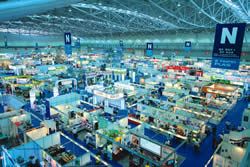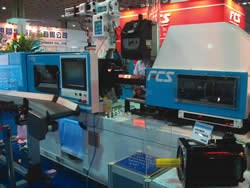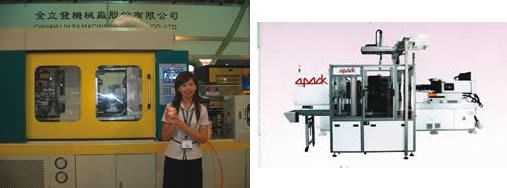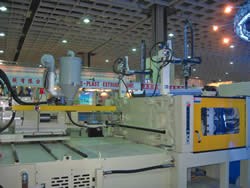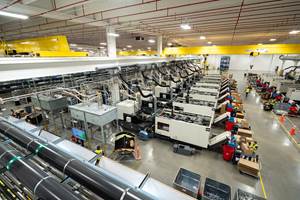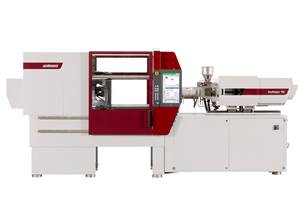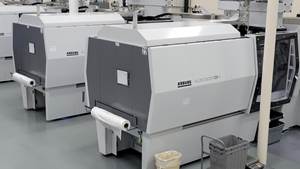Injection Molding: Taiwan Machine Builders Focus on All-Electrics, Hybrids and IML
There was a brand-new emphasis at this year’s Taipei Plas, the premier plastics exhibition for Taiwanese injection machine builders.
There was a brand-new emphasis at this year’s Taipei Plas, the premier plastics exhibition for Taiwanese injection machine builders. For the first time, the spotlight was on new energy-saving all-electric and hybrid electric machines based on locally sourced servo technology to better compete with Japanese and European vendors. Another theme was Taiwan-built turnkey in-mold labeling systems at the 11th annual show, held in September and sponsored by the Taiwan External Trade Development Council and the Taiwan Association of Machinery Industry.
The focus on energy saving from Taiwanese machine makers follows global demand for alternatives to fully hydraulic presses or machines that use fixed-displacement pumps. Suppliers from the Republic of China (Taiwan) say their aims are different from those of machine builders in the mainland Peoples Republic of China, whose major emphasis is on low cost. In Taiwan, the focus is on higher-end technology at a competitive price.
Taiwan exports nearly 80% of its machines, so in order to compete with higher priced Japanese and European electric or hybrid models, Taiwanese companies have developed lower-cost high-performance models. The big news at the show was that some of the new models for the first time have servomotor drives developed and manufactured in Taiwan. A $120-million, multi-year research project undertaken by the Taiwan Industrial Technology Research Institute and Taiwan motor maker Teco Electro devices yielded 3-kw and 7.5-kw servomotors. Sources say these servomotors can be at least 20% less costly than those made in Japan while delivering comparable performance. Taiwanese machine builders hope that will be a crucial competitive advantage, allowing their all-electric machines to be priced 40% to 60% less than Japanese or European brands.
Some Taiwanese machine builders have adopted them outright. Others are interested in the home-grown motor technology but are waiting for it to be proven in the field. In the meantime, they are purchasing Japanese servomotor components for machines built in Taiwan, which saves at least 20%, while others are buying a fully assembled servomotor from Japan—typically the Daikin servo frequency-inverter pump system.
Taiwanese injection machine suppliers looking to promote their technology to global customers will exhibit at next year’s NPE 2009 in Chicago and/or are establishing or strengthening their sales and service presence in the Americas.
ALL-ELECTRIC ARRIVALS
One new machine featuring the Teco servomotors comes from Fu Chun Shin (FCS), which introduced the 50-ton HE-50 all-electric press. The company (which has a Mexican sales/service center) says it performs like a Japanese machine but costs 30% less. The HE model has separate motors with belts and ballscrews for plasticating, clamping, and ejection, and two more for injection. It also uses electric motors for carriage movement. Injection speed is 300 mm/sec, and response time is said to be 15 millisec. The HE-50 comes with a 22-mm-diam. screw and the new FCS 6000 PC-based control system with a 15-in. touchscreen.
Multiplas (represented here by New Pacific Machinery) introduced a 55-ton vertical all-electric machine at the show that uses the Teco servomotor system. The model V3E is said to offer 40% to 60% energy savings. A rotary-table version (V3E-R-55T) turns in 1.5 sec with servo power, versus 3 sec with hydraulics. Standard injection speed is 300 mm/sec, vs. 100 mm/sec for a hydraulic model. Next year may see 35- and 80-tonners join the line.
The K series all-electric line was introduced by TMC Technology Corp. Comprising five models from 33 to 165 tons, it uses servomotors from Japan. TMC is considering the use of servomotors made or assembled in Taiwan, which the firm believes can reduce the motor price by 30% and the overall machine price by 15%. AC servos with belts and ballscrews are used for injection, plasticating, clamping, and ejection. Standard injection speed is 300 mm/sec, and 500 mm/sec is optional.
A new 300-ton model becomes the largest in the V alpha II series of belt-drive all-electric toggle presses from Victor Tai-chung (represented here by Fortune International). The series, which starts at 55 tons, uses a Japanese servo-drive system that delivers injection speeds from 300 to 400 mm/sec and response time of 35 millisec.
Creator Precision Co. Ltd. of Taichung, a maker of CNC wire EDM machines as well as injection presses, added a new 45-ton model to the 100- and 130-ton models in its ES series of all-electric injection machines. The machines use four Mitsubishi servomotors and a Mitsubishi controller for clamping, plasticating, injection, and ejection. Direct drive is used for injection while a belt drive is employed for the other main motions. The new ES 45 has 300-mm/sec injection. Shot-to-shot variation is said to be under 1% of product weight. Creator, which plans to exhibit at NPE 2009, says 20% of its machine sales are all-electric.
Lien Yu tried several years ago to build an all-electric press in a project with the Taiwanese government, but the main components then had to be imported from Japan and prices were high. Lien Yu opted for a hybrid clamp system as a compromise between energy savings and hardware cost. Now the firm offers a choice of a Japanese (Daikin) or European (Siemens) servomotor to drive the hydraulic motor on its new Euro D&G series of hybrid toggle presses. The new line is an upgraded combination of the company’s D series from 75 to 500 tons and its G series spanning 700 to 2300 tons.
In addition, Toyo Machinery & Metal of Japan (represented here by Maruka U.S.A.) now offers higher injection speed options and response times for its Plastar IV all-electric line. In addition to the standard 300- to 500-mm/sec speed and 17- to 20-millisec response time, two new options are 700 mm/sec injection with two servomotors or 1000 mm/sec with three. Response time is 1.5 millisec with either option.
HYBRIDS HEAT UP
Hwa Chin Machinery introduced its HC-SE hybrid toggle line a year ago. It uses a high-torque servo-driven hydraulic pump from Yuken of Japan. The line ranges from 88 to 3200 tons and reportedly delivers energy savings up to 40% compared with a variable-volume hydraulic pump. It has response time of less than 100 millisec.
FCS introduced the HT-SV series of hybrid machines, which use a Japanese servomotor pump drive that’s said to deliver 40% energy savings versus a variable-volume pump system and 70% to 80% less energy than a fixed-volume hydraulic machine.
Year-Chance Machinery Co. brought out its YC-ES series hybrid presses, its first use of servomotors (from Japan’s Daikin). The company claims 40% energy savings compared with variable-volume pumps and 70% vs. a fixed pump. The servomotors and controls reportedly also allow for faster injection and tighter control. Injection is said to be accurate to within less than 1% of set volume, and response time is 70 millisec. The new line is offered in nine models from 28 to 518 tons with a base price of $20,000 for the smallest model and $126,000 for the largest. The company is seeking a U.S. sales agent.
Shuenn Jaan Machinery introduced its SJ Ei line of horizontal presses with servomotor hydraulic pump drives. They use Daikin motors and controls, which provide less than 5 millisec response and positioning accuracy of ±0.01 mm. The SJ Ei line also features an outward-facing five-point toggle design said to provide 40% more daylight than conventional toggles. Force is concentrated in the center of the platen to minimize deflection. The company is designing a new direct clamping system for future models.
TURNKEY IML SYSTEMS
Fully integrated turnkey in-mold labeling (IML) systems have emerged from Taiwanese injection machine suppliers as their answer to Asian demand for lower-cost, reliable, high-output systems. Most of these companies subcontract to other suppliers for the label magazine, hot-runner mold, robot, and automation system, while some have developed and patented their own components. Systems for simple lids up to eight-sided containers in multiple cavities are offered for high-speed, thin-wall applications.
FCS introduced its A-Pack turnkey IML system for milk, yogurt, tea, coffee, juice, and mineral-water packaging. It is a total solution integrating the machine, mold, labels, label feeder, and robot. FCS says the A-pack system is highly repeatable and accurate and delivers 5-sec cycles and a throughput of 1.5 million pieces/month. A-Pack can be used for both IML and general injection molding, so IML orders can be flexibly coordinated with regular production.
The injection machine is an AF 200 (220-ton) hybrid press, which uses a new servomotor and closed-loop hydraulics with a Moog servovalve. It uses an accumulator for injection speeds up to 500 mm/sec. The clamping system is said to be 30% more rigid than on standard machines. It is designed to overlap operations such as plasticating, suck-back, mold opening, ejection, and robot movements so as to cut cycle time by around 40%.
The hot-runner mold has a special rapid-cooling system (said to complete cooling within 0.5 sec) and a vacuum label-holding mechanism. It also has a modular design with standard center distances so that different tooling can be used and standard molding can be interchanged flexibly with IML jobs.
A-Pack also includes the labels themselves (including printing), label holder, patented label feeder, robot, and product stacker. The robot is a servo-driven, three-axis, top-entry type with label placement accuracy of ±0.05 to 0.08 mm. It simultaneously inserts the labels and takes finished parts out of the mold.
FCS has sold 12 A-Pack IML systems with up to six cavities in China, Korea, and Sudan. A typical system produces a 250-cc round cup in four cavities in a 6- to 8-sec. cycle, making one million units per year.
Huarong says its IML system, developed over the past five to six years, is now able to produce anything from 25-liter (4-gal) pails in single cavities to containers as small as 85 cc in up to eight cavities. The company has 18 to 20 IML systems operating outside of Taiwan and China, although these regions are its initial focus.
Huarong says that its IML-ready hybrid machine has extended daylight and a more efficient screw design (especially important when recycled materials may be used in products such as industrial pails.) Mold-open positioning is improved to ensure accurate label placement and simultaneous part takeout. The IML system uses static electricity for the dummy core that carries the label and vacuum in the mold for label positioning.
Turnkey IML systems from TMC can now use the company’s Ex 3 series high-speed, closed-loop hydraulic press, which has a hybrid option with servomotor drive for screw recovery and a servomotor pump system for the other functions. TMC’s IML system includes the machine, hot-runner mold, 3-axis IML robot, electrostatic generator, label feeder, labels, and stacking equipment.
OTHER PACKAGING MACHINES
FCS showed its AD-150 (150-ton) Cap Series hydraulic press for cap production. It overlaps mold opening, ejection, and plastication to achieve a 4.8-sec cycle time with 24 cavities of 2.1-g HDPE or PP caps. Production can be up to 9 million caps/month.
Huarong added a 220-ton HR220 PET preform machine to its HR PET line. It features a post-mold cooling station that is separate from the mold but within the manufacturing cell. It is said to reduce molding cycle time 35% to 40%. Two robots demold the preforms and place them in the cooling station, which can handle up to 48 preforms. Huarong offers 12 machines from 150 to 520 tons to produce preforms for 350-cc to 5-liter containers in four to 48 cavities. They can mold preforms for PET jars from 63 to 120 mm diam. in four or eight cavities.
Related Content
Arburg Open House Emphasizes Turnkey Capabilities
Held at the company’s U.S. headquarters in Rocky Hill, Connecticut, the event featured seven exhibits, including systems that were designed, sourced and built in the U.S.
Read MoreIPEX Opens Injection Molding Facility in North Carolina
The pipe and fittings manufacturer’s new 200,000-square-foot facility represents a $200 million investment and will create 150 jobs.
Read MoreFakuma 2023: Wittmann Battenfeld Expands All-Electric Line, Direct-Current Capabilities
Wittmann Battenfeld will introduce the new EcoPower B8X injection molding machine line and show direct current as an energy source for a concept machine that will power its own robot.
Read MoreConsistent Shots for Consistent Shots
An integral supplier in the effort to fast-track COVID-19 vaccine deployment, Retractable Technologies turned to Arburg and its PressurePilot technology to help deliver more than 500 million syringes during the pandemic.
Read MoreRead Next
For PLASTICS' CEO Seaholm, NPE to Shine Light on Sustainability Successes
With advocacy, communication and sustainability as three main pillars, Seaholm leads a trade association to NPE that ‘is more active today than we have ever been.’
Read MorePeople 4.0 – How to Get Buy-In from Your Staff for Industry 4.0 Systems
Implementing a production monitoring system as the foundation of a ‘smart factory’ is about integrating people with new technology as much as it is about integrating machines and computers. Here are tips from a company that has gone through the process.
Read MoreBeyond Prototypes: 8 Ways the Plastics Industry Is Using 3D Printing
Plastics processors are finding applications for 3D printing around the plant and across the supply chain. Here are 8 examples to look for at NPE2024.
Read More



